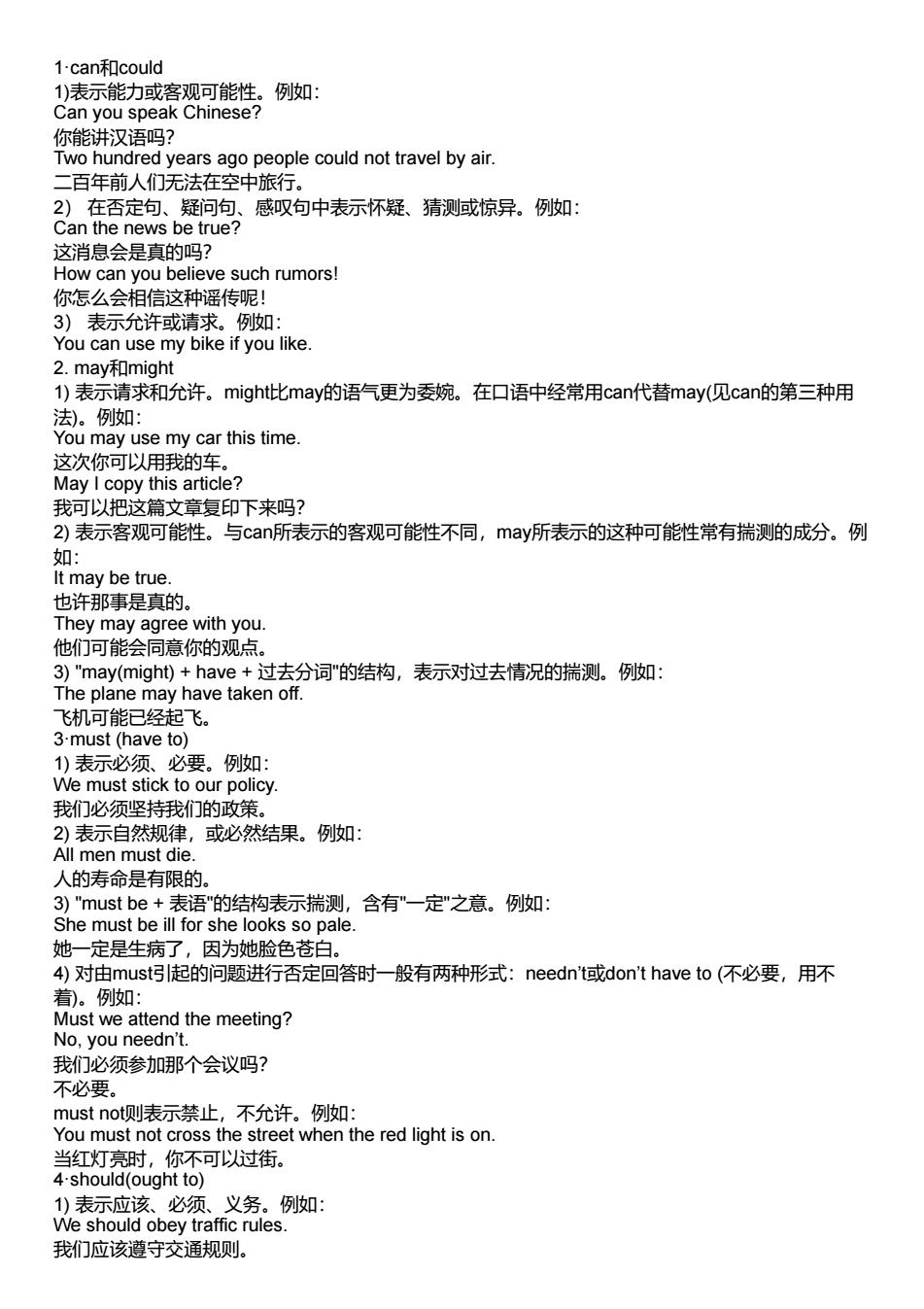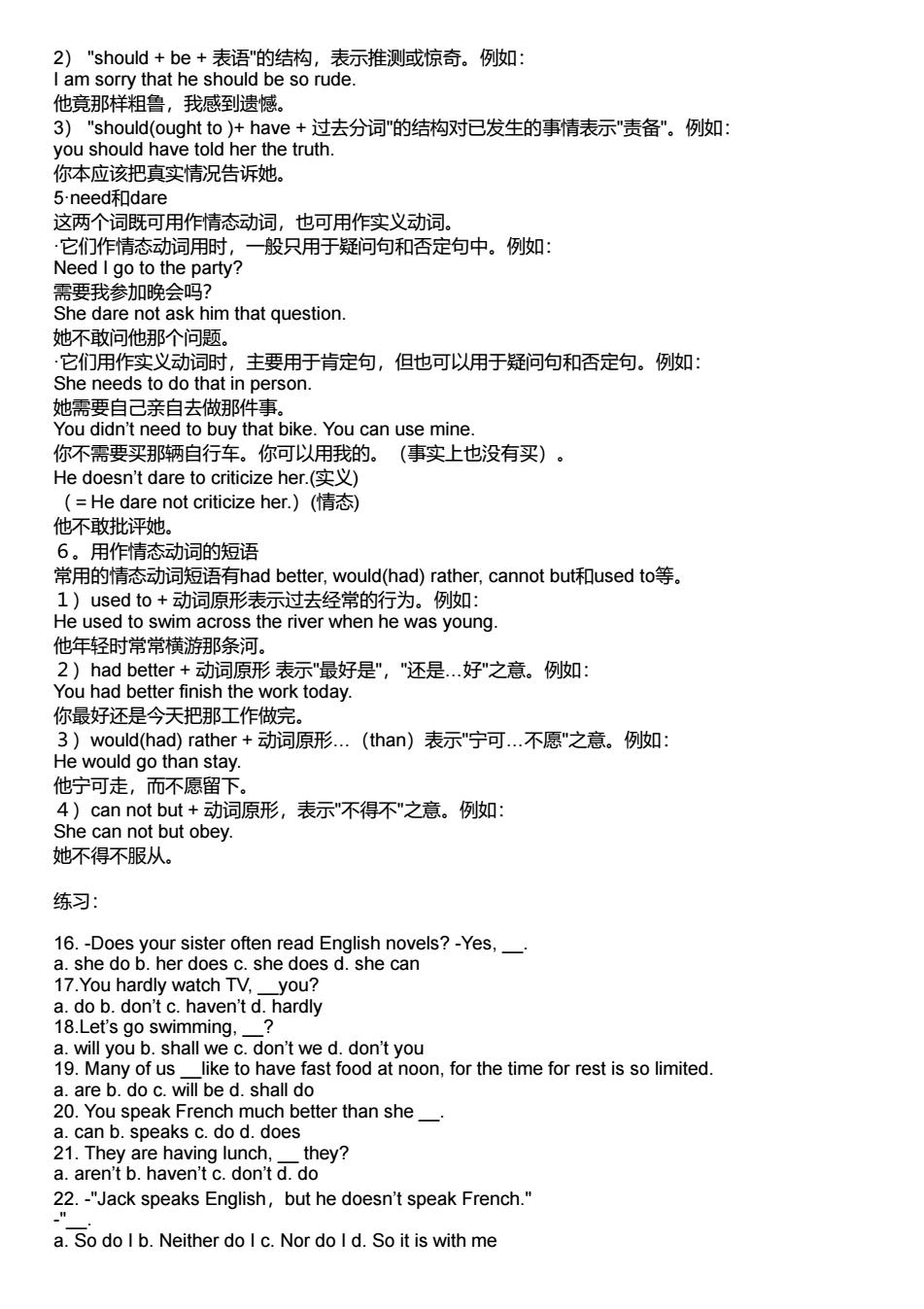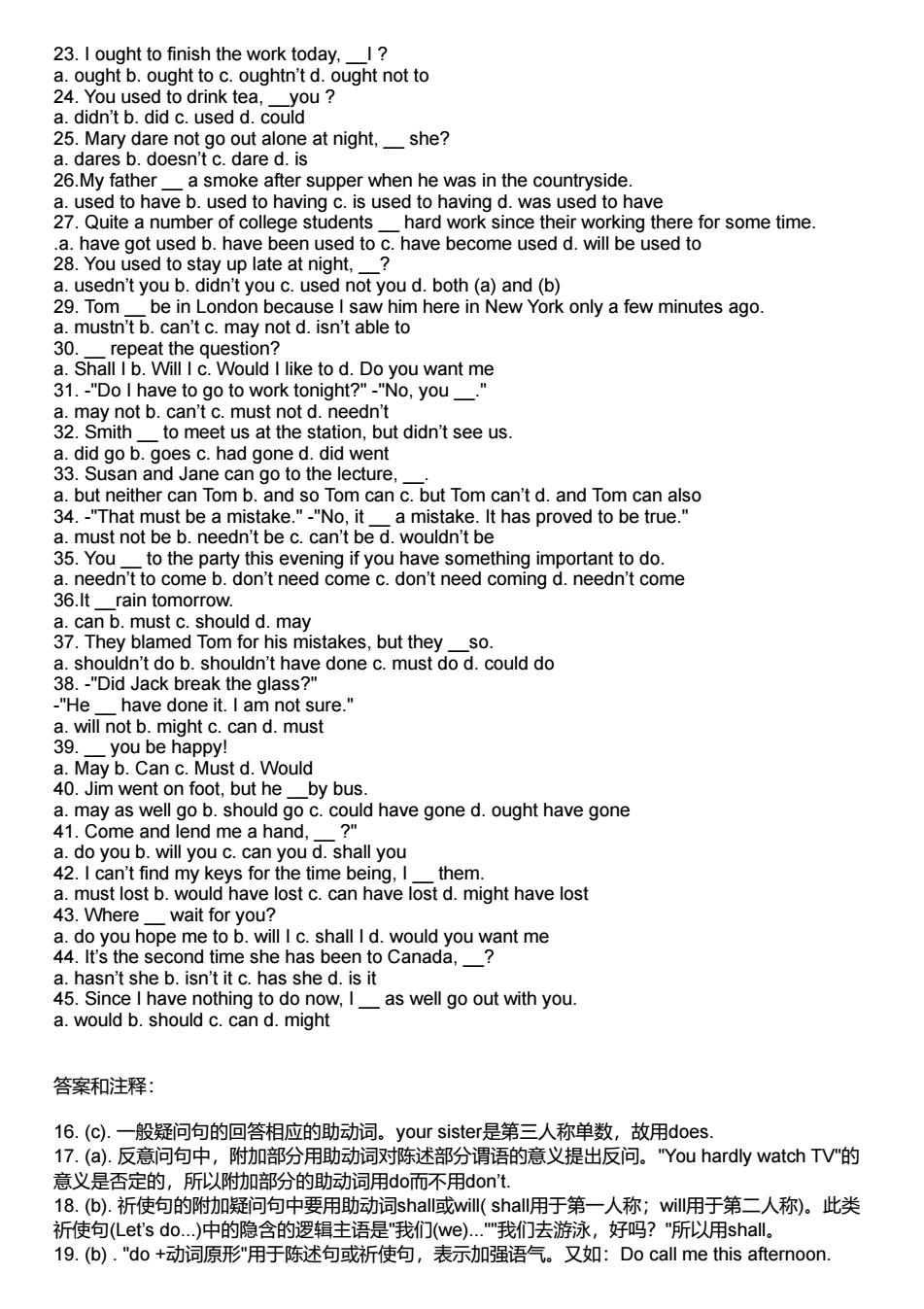
1-can和could 1)表示能力或客观可能性。例如: Can you speak chinese? 汉语}oco ntavei by 二百年前人们无法在空中旅行 3 否定句 ,感叹句中表示怀疑、猜测或惊异。例破如 这消息会是真的吗? eve e such rumors 你怎么会相信这种谣传呢 3)表示允许或请求。例如: You can use my bike if you like. 2.may和might 1)表示请求和允许。might此may的语气更为委婉。在口语中经常用can代替may(见can的第三种用 别bn use my car this time 可以用我 s article? 这篇文章复印下来吗? 2)表示客观可能性。与can所表示的客观可能性不同,may所表示的这种可能性常有揣测的成分。例 如 It may be true 也许那事是真的 They may agree with you 他们可能会同意你的观点 乳e e my v ake过分词的结,构表标对过去情况的测、如 y have taken off. 飞机可能已经起飞。 3-must(hav 标 必要。例如 ck to our policy. 我们必须坚持我们的政策 2)表示自然规律,或必然结果。例如: All men must die 人的寿命是有限的, 3)"must be+表语"的结构表示揣测,含有"一定"之意。例如 She must be ill for she looks so pale. 她一定是生病了,因为她脸色苍白 4)对由must引起的问题进行否定回答时一般有两种形式:needn't或don't have to(不必要,用不 着 例如 我们必须参加那个会议吗? 不必要。 must notl则表禁止,不允许。列如: You must not cross the street when the red light is on. 当红T高时,你不可以村街 4.should(ouaht to) )示应该以须 、义务。例如 We should obey traffic rules 我们应该遵守交通规则
1·can和could 1)表示能力或客观可能性。例如: Can you speak Chinese? 你能讲汉语吗? Two hundred years ago people could not travel by air. 二百年前人们无法在空中旅行。 2) 在否定句、疑问句、感叹句中表示怀疑、猜测或惊异。例如: Can the news be true? 这消息会是真的吗? How can you believe such rumors! 你怎么会相信这种谣传呢! 3) 表示允许或请求。例如: You can use my bike if you like. 2. may和might 1) 表示请求和允许。might比may的语气更为委婉。在口语中经常用can代替may(见can的第三种用 法)。例如: You may use my car this time. 这次你可以用我的车。 May I copy this article? 我可以把这篇文章复印下来吗? 2) 表示客观可能性。与can所表示的客观可能性不同,may所表示的这种可能性常有揣测的成分。例 如: It may be true. 也许那事是真的。 They may agree with you. 他们可能会同意你的观点。 3) "may(might) + have + 过去分词"的结构,表示对过去情况的揣测。例如: The plane may have taken off. 飞机可能已经起飞。 3·must (have to) 1) 表示必须、必要。例如: We must stick to our policy. 我们必须坚持我们的政策。 2) 表示自然规律,或必然结果。例如: All men must die. 人的寿命是有限的。 3) "must be + 表语"的结构表示揣测,含有"一定"之意。例如: She must be ill for she looks so pale. 她一定是生病了,因为她脸色苍白。 4) 对由must引起的问题进行否定回答时一般有两种形式:needn’t或don’t have to (不必要,用不 着)。例如: Must we attend the meeting? No, you needn’t. 我们必须参加那个会议吗? 不必要。 must not则表示禁止,不允许。例如: You must not cross the street when the red light is on. 当红灯亮时,你不可以过街。 4·should(ought to) 1) 表示应该、必须、义务。例如: We should obey traffic rules. 我们应该遵守交通规则

2)"should+be+表语"的结构,表示推测域惊奇。例如: I am sorry that he should be so rude. 他境那样粗鲁,我感到遗憾。 "should(o ught to)+ha +过去分词"的结构对已发生的事情表示"责备”。例如 ud ha he 你本应该把真实情况告诉她。 5need和dare 这两个词既可用作情态动词,也可用作实义动词。 它们作情态动词用时, 一般只用于疑问句和否定句中。例如: Need I go to the party? 需要我参加晚会吗? She dare not ask him that question. 她不敢问他那个问题 它们用作实义 词时 主要用于肯定句,但也可以用于疑问句和否定句。例如 on 她需要 自己亲自 去做那 You did buy that bike. You can use mine 你不需要买那辆自行车。你可以用我的。(事实上也没有买)。 He doesn't dare to criticize her.(实义) (=He dare not criticize her.)(情态) 他不敢批评她 6。用作情态动词的短语 常用的情态动词短语有had better,would(had)rather,cannot but和used to等, 1)used to+动词原形表示过去经常的行为。例如: He used to swim across the river when he was young. 他年轻时常常横游那条河。 2)had better+动词原形表示"最好是","还是.好"之意。例如: You had better finish the work today. 你最好还是今天把那工作做完】 d(had)rath +动词原形.(than)表示"宁可不愿"之意。例如 他宁可走,而不愿留下。 4)can not but+动词原形,表示"不得不"之意。例如: She can not but obey. 她不得不服从。 练习: 16.-Does your sister often read English novels?-Yes, You hardly watch TV _you tc.haven't d hardly ing. 19.Man of us like to ha ave fast fo a.are b.do c.will be d.shall do 20.You speak French much better than she a.can b.speaks c.do d.does 21.They are having lunch, ey? a.aren't b.haven't c.don't d.do 22.-"Jack speaks English,but he doesn't speak French." a.So do I b.Neither do Ic.Nor do I d.So it is with me
2) "should + be + 表语"的结构,表示推测或惊奇。例如: I am sorry that he should be so rude. 他竟那样粗鲁,我感到遗憾。 3) "should(ought to )+ have + 过去分词"的结构对已发生的事情表示"责备"。例如: you should have told her the truth. 你本应该把真实情况告诉她。 5·need和dare 这两个词既可用作情态动词,也可用作实义动词。 ·它们作情态动词用时,一般只用于疑问句和否定句中。例如: Need I go to the party? 需要我参加晚会吗? She dare not ask him that question. 她不敢问他那个问题。 ·它们用作实义动词时,主要用于肯定句,但也可以用于疑问句和否定句。例如: She needs to do that in person. 她需要自己亲自去做那件事。 You didn’t need to buy that bike. You can use mine. 你不需要买那辆自行车。你可以用我的。(事实上也没有买)。 He doesn’t dare to criticize her.(实义) (=He dare not criticize her.)(情态) 他不敢批评她。 6。用作情态动词的短语 常用的情态动词短语有had better, would(had) rather, cannot but和used to等。 1)used to + 动词原形表示过去经常的行为。例如: He used to swim across the river when he was young. 他年轻时常常横游那条河。 2)had better + 动词原形 表示"最好是","还是.好"之意。例如: You had better finish the work today. 你最好还是今天把那工作做完。 3)would(had) rather + 动词原形.(than)表示"宁可.不愿"之意。例如: He would go than stay. 他宁可走,而不愿留下。 4)can not but + 动词原形,表示"不得不"之意。例如: She can not but obey. 她不得不服从。 练习: 16. -Does your sister often read English novels? -Yes, _. a. she do b. her does c. she does d. she can 17.You hardly watch TV, _you? a. do b. don’t c. haven’t d. hardly 18.Let’s go swimming, _? a. will you b. shall we c. don’t we d. don’t you 19. Many of us _like to have fast food at noon, for the time for rest is so limited. a. are b. do c. will be d. shall do 20. You speak French much better than she _. a. can b. speaks c. do d. does 21. They are having lunch, _ they? a. aren’t b. haven’t c. don’t d. do 22. -"Jack speaks English,but he doesn’t speak French." -"_. a. So do I b. Neither do I c. Nor do I d. So it is with me

23.I ought to finish the work today.1? 24c8ieg0a98o"0 ought not to 4aautea8 out alone at night,she? a.dares b.doe 26.My father a smoke after supper when he was in the countryside. 28ioaeber8eae9e8eAsaanae9ec8neeage hard work since their working there for some time. ed to c.have become used d.will be used to 2.en1you6 tay up late at night you c.use not you d.both(a包ando notd.isn'table to nhere in New York only a few minutes ago 30. neat the a.Shall I b.Will I c.Would I like to d.Do you want me 31.-"Do I have to go to work tonight?"-"No,you meet e lon to meet us at the station.but didn't see us. ed did went anan 'go t om b can c.but Tom "No it a.must not be b eedn't be c.can't be d.w muldn't be 35.You to the party this eve ning if you have something important to do. a.needn't to come b.don't need come c.don't need coming d.needn't come ustshould d.may 36.It rain tomorrow. They bla Tom for his mistakes,but they 50 t sure." will not b. c ca you be happy! a.May b.Can c.Must d.Would 40.Jim went on foot,but he by bus. mays well o b.shou o c.could have one d.ougt have Come ana lena me a nand do you you c.c d.shall you ost b d my keys to might have lost wait for hope me to b.will I c.shall I d.would youv e second time she has been to canad nr llgoou ih you. a.would b.should c.can d.might 答案和注释 16.(c). 般疑问句的回答相应的助动词。your sister是第三人称单数,故用does. 17.(a).反意问句中,附加部分用助动词对陈述部分谓语的意义提出反问。"You hardly watch TV的 意义是否定的,所以附加部分的助动词用do而不用dont. 18.(b).祈使句的附加疑问 要用助动词shal回或wil(sha用于第一人称;wi用于第二人称).此类 祈使句(Let'sdo中的隐含的逻辑主语是我们(we)."我们去游泳,好吗?"所以用sha。 19.(b)."do+动词原形"用于陈述句或祈使句,表示加强语气。又如:Do call me this afternoon
23. I ought to finish the work today, _I ? a. ought b. ought to c. oughtn’t d. ought not to 24. You used to drink tea, _you ? a. didn’t b. did c. used d. could 25. Mary dare not go out alone at night, _ she? a. dares b. doesn’t c. dare d. is 26.My father _ a smoke after supper when he was in the countryside. a. used to have b. used to having c. is used to having d. was used to have 27. Quite a number of college students _ hard work since their working there for some time. .a. have got used b. have been used to c. have become used d. will be used to 28. You used to stay up late at night, _? a. usedn’t you b. didn’t you c. used not you d. both (a) and (b) 29. Tom _ be in London because I saw him here in New York only a few minutes ago. a. mustn’t b. can’t c. may not d. isn’t able to 30. _ repeat the question? a. Shall I b. Will I c. Would I like to d. Do you want me 31. -"Do I have to go to work tonight?" -"No, you _." a. may not b. can’t c. must not d. needn’t 32. Smith _ to meet us at the station, but didn’t see us. a. did go b. goes c. had gone d. did went 33. Susan and Jane can go to the lecture, _. a. but neither can Tom b. and so Tom can c. but Tom can’t d. and Tom can also 34. -"That must be a mistake." -"No, it _ a mistake. It has proved to be true." a. must not be b. needn’t be c. can’t be d. wouldn’t be 35. You _ to the party this evening if you have something important to do. a. needn’t to come b. don’t need come c. don’t need coming d. needn’t come 36.It _rain tomorrow. a. can b. must c. should d. may 37. They blamed Tom for his mistakes, but they _so. a. shouldn’t do b. shouldn’t have done c. must do d. could do 38. -"Did Jack break the glass?" -"He _ have done it. I am not sure." a. will not b. might c. can d. must 39. _ you be happy! a. May b. Can c. Must d. Would 40. Jim went on foot, but he _by bus. a. may as well go b. should go c. could have gone d. ought have gone 41. Come and lend me a hand, _ ?" a. do you b. will you c. can you d. shall you 42. I can’t find my keys for the time being, I _ them. a. must lost b. would have lost c. can have lost d. might have lost 43. Where _ wait for you? a. do you hope me to b. will I c. shall I d. would you want me 44. It’s the second time she has been to Canada, _? a. hasn’t she b. isn’t it c. has she d. is it 45. Since I have nothing to do now, I _ as well go out with you. a. would b. should c. can d. might 答案和注释: 16. (c). 一般疑问句的回答相应的助动词。your sister是第三人称单数,故用does. 17. (a). 反意问句中,附加部分用助动词对陈述部分谓语的意义提出反问。"You hardly watch TV"的 意义是否定的,所以附加部分的助动词用do而不用don’t. 18. (b). 祈使句的附加疑问句中要用助动词shall或will( shall用于第一人称;will用于第二人称)。此类 祈使句(Let’s do.)中的隐含的逻辑主语是"我们(we).""我们去游泳,好吗?"所以用shall。 19. (b) . "do +动词原形"用于陈述句或祈使句,表示加强语气。又如:Do call me this afternoon

20.(d).这里要用助动词代替前面动词,因为than后是简略表达方式,要用助动词,不用实义动词。 合。品是勤向3加部分的助动词与迷部分一支高义相版ey are aving unc 句中 22.(d).上句中有肯定也有否定,因此,下句不能用一个助动词o来代替两种情况 23.(c).Ought to=should,但是,在疑问句中用"ought(not)+主语+to+动词"的形式 24.(a).used to表示过去的习惯行为,其否定式为did not use to或used not to,所以反意疑问部分 用"did not+主语"或 0t+士 25.(c).dare在这 是助动词,所以没有人称单复数变化。 26.(a)"used to+动词原形"意为"过去贯常",表示过去经常性的行为或习惯。"used to+动词原形 同"be/get/become used to+名词或动名词"是两种不同的结构,用法也不同。前者的"used to"是情 态动词+实义动词,后者属系表结构to是介词,意为"习惯于”,如:He used to live there.他过去 向住那儿 29.(b).can't问表示"客观上不可能;isn't able to则表示"无能力";may not表示"把握不大的猜 测”或主观上不赞同”之意。 30.(a).wil与第一人称连用表示"主观上的打算",则不能用Wil的句式来询问对方;shall与第一人称 表示征求对方的意见 31.(@.对have to do some 的否定回答用needn't(不必)。 32.()."史密斯确实去车站接我们了,但没有看见我们。"助动词o用来表示强调,加强语气作用, 后接动词原形 33.(c).这里对Tom的叙述只可能有两种情况:一)他也能去;二)他也不能去。若是第一种情形, 则用and so can Tom; 无此选择,所以只可能是第二种情况选(⊙(但汤姆不能去 34.(.语气强烈的肯定判断用must be,依据充分的否定判断用can't be;must no侧表示纯主观上 的“不允许”。 35.(d).needn't后接动词原形表示现在一段时间内"没有必要做某事。"不能选(b),因为如果把need 用做实义动词,则要用don't need to come的形式。 36.(d).may在这里表示主观上的猜测,若选用must(表示自然规律) 显得缺乏依据 37.(b).shoulc (shouldn')后接现在完 时表示做了 一件不应该做的事 38.(b).might后接现在完成时表示对过去某种情况的猜测,但把握不大;如选用must则表示已有充 分依据。 39.(a).May you be是表示祝的句式 40.(c).could+现在完成时表示"客观上本来可以做某件事, 但事卖上知没有做” 41.().用祈使句 肯定)表示请求时,其反意问句的附加部分 一般用will you形式。 42.(d).might后接现在完成时表示"说话者的主观猜测"。 43.(c).Shall I.?句式用来表达"征求对方说话者行为的意见。"(a)不对。因为不能说hope somebody to do.(一般说hope to do.或hope+从句);(b)不对。因为wil与第一人称连用表示"自己 的意愿”,不能用来表达"“征求对方意见” 44.().反意问句的附加部 一般是对主句的谓语进行发问。 45.(d)."既然我现在没什么事,不如和你一道出去郊游。"might as well后接动词原形表示"完全可以 做某事”那样去做不会有什么损失,可能还有所获
20. (d). 这里要用助动词代替前面动词,因为than后是简略表达方式,要用助动词,不用实义动词。 21. (a). 反意问句的附加部分的助动词与陈述部分一致,意义相反,在They are having lunch一句中 are是助动词。 22.(d). 上句中有肯定也有否定,因此,下句不能用一个助动词do来代替两种情况。 23. (c ). Ought to =should, 但是,在疑问句中用"ought ( not) +主语+to +动词"的形式。 24. (a). used to表示过去的习惯行为, 其否定式为did not use to或 used not to,所以反意疑问部分 用"did not +主语"或"used not +主语"。 25. (c ). dare在这里是助动词,所以没有人称单复数变化。 26. (a) "used to +动词原形" 意为 "过去贯常",表示过去经常性的行为或习惯。"used to +动词原形" 同"be/get/become used to +名词或动名词"是两种不同的结构,用法也不同。前者的"used to" 是情 态动词+实义动词,后者属系表结构(to是介词),意为"习惯于", 如:He used to live there. 他过去一 向住那儿。 He was used to rising early. 他过去习惯早起。 27. (b). 28. (d). 29. (b). can’t可表示"客观上不可能";isn’t able to则表示"无能力";may not表示"把握不大的猜 测"或"主观上不赞同"之意。 30. (a). will与第一人称连用表示"主观上的打算",则不能用Will I的句式来询问对方;shall与第一人称 连用表示"将来",可用"Shall I"方式询问对方,表示征求对方的意见。 31. (d). 对"have to do something"疑问句的否定回答用needn’t(不必)。 32. (a). "史密斯确实去车站接我们了,但没有看见我们。"助动词do用来表示强调,加强语气作用, 后接动词原形。 33. (c). 这里对Tom的叙述只可能有两种情况:一)他也能去;二)他也不能去。若是第一种情形, 则用and so can Tom;(无此选择),所以只可能是第二种情况. 选(c)(但汤姆不能去。) 34. (c). 语气强烈的肯定判断用must be;依据充分的否定判断用can’t be; must not则表示纯主观上 的"不允许"。 35. (d). needn’t后接动词原形表示现在一段时间内"没有必要做某事。"不能选 (b),因为如果把need 用做实义动词,则要用 don’t need to come的形式。 36.(d). may在这里表示主观上的猜测,若选用must(表示自然规律),则显得缺乏依据。 37. (b). should not (shouldn’t)后接现在完成时表示"做了一件不应该做的事。" 38. (b). might后接现在完成时表示对过去某种情况的猜测,但把握不大;如选用must则表示已有充 分依据。 39. (a). May you be是表示祝愿的句式。 40.(c). could + 现在完成时表示"客观上本来可以做某件事,但事实上却没有做。" 41.(b). 用祈使句式肯定)表示请求时,其反意问句的附加部分一般用will you形式。 42.(d). might后接现在完成时表示"说话者的主观猜测"。 43.(c). Shall I. ?句式用来表达"征求对方说话者行为的意见。" (a) 不对。因为不能说 hope somebody to do. (一般说hope to do. 或hope +从句);(b)不对。因为will与第一人称连用表示"自己 的意愿",不能用来表达"征求对方意见"。 44. (b). 反意问句的附加部分一般是对主句的谓语进行发问。 45. (d). "既然我现在没什么事,不如和你一道出去郊游。"might as well后接动词原形表示"完全可以 做某事"-那样去做不会有什么损失,可能还有所获